← Back to Reviews
in
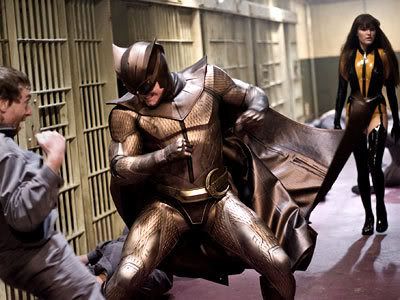
WATCHMEN
I didn't want Watchmen to be made. I really didn't. I've followed the project since Terry Gilliam was attached to direct for Warner Bros. back in 2000, and have not-so-secretly hoped that the film would never get off the ground. The book is just too tightly woven to warrant even a shot. It's the purist in me, I guess. It's true, Alan Moore and Dave Gibbons fashioned something special, something that pulled comic books out of the hands of youngsters and showed that it could tell the darker stories fans were hungry for.
That was 1986, a far cry from the violence and sex that saturate comic book shelves today... to the chagrin of vigilant parents. But Watchmen holds up, because its indulgence of the amoral is really only the doorway. What lies beyond is a deeply painful and unapologetic view of the nature of human beings.
The superhero was always a farce. We knew that. But it's nice to pretend a better world existed, that individuals capable of unbelievable marvels dealt out deserved justice to our evils thanklessly, and we liked to believe we could find a little bit of ourselves among the pages.
And yet, Watchmen refuses to believe. In this alternate history, real people choose to don costumes and take to the streets: angry, jaded, and wounded deeply in the soul. They're not righteous. And their world, to our horror, isn't unbelievable. It's not even improbable. Every bit of our slovenly and capricious behavior has carried over, and we've ended up in much the same place we're in now... only worse.
This is where we enter the film, and I applaud Zack Snyder for setting the precedent for the kind
of universe his viewers are about to visit. They might not be familiar with any of the characters, but they'll damned sure understand it's a world they don't want to live in.
For the most part, the film runs parallel to the graphic novel. As with any adaptation, there are varying degrees of additions, omissions, and edits. Some of them make sense in the context of the film, while others are obvious missteps. I could launch into a detailed breakdown on how these two monolithic versions stack up against each other, but I think it's fair to say that Snyder and crew have successfully distilled not only the core narrative of Watchmen, but have also retained a substantial amount of detail and packaged it into a stylish, vibrant product that genuinely feels like Watchmen come alive.
That's not to say they left no man behind. I found most of the alterations surprisingly bearable, but there were two general changes made that I'm still having trouble choking down:
The action in the film is notably spectacular, and I found myself thinking that a lot of filmmakers (particularly one whose name begins with Christopher Nolan) might benefit from studying the slow-motion to fast motion fighting as its employed here. In 300, it was stylish masturbation; in Watchmen, it's downright brutal science.
That said, the action could have done with much less out-of-nowhere violence. I knew the film would be rough, and in some places gory, but wow... whatever justification Snyder and crew had in their minds when they chose some of this stuff, I'll never understand. There's definitely a point at which your film becomes indulgent in its own devices, and Snyder remains an all-too-bloodthirsty
visionary. Don't take your kids.
Performances range from pleasantly rewarding to awful, with Patrick Wilson (Dan Dreiberg) and Carla Gugino (Sally Jupiter) being the standouts on either side of the spectrum, respectively. Billy Crudup delivers a curiously misinterpreted take on Dr. Manhattan, which I struggled with for the entire film. The soft sadness in his voice is not even close to what I thought Manhattan would sound like.
The pacing of the film is surprisingly competent and restrained, and is allowed to unfold in much the same way the graphic novel does. However, that might be the film's greatest weakness to those who haven't read the book. I honestly can't recommend Watchmen to someone who doesn't already know the story. Perhaps they might be able to overcome the film's density and relative loyalty to the graphic novel, but if it wasn't for the brutal action, I doubt many would have stayed in the theater till the end. It's a lot to take in, and somewhere in the middle, things can get murky for the uninitiated.
Still, for all its flaws, Watchmen is an impressive translation that could doubtfully get better without venturing into an even more difficult marketing strategy than it already needed to solve. It feels like a production by fans for fans, and yet not so self-indulgent that it yields the book for the sake of taking over and re-imagining the whole thing. It lets the story tell itself, and in some cases -- for good or ill -- helps it along. And that's all I really wanted to see.
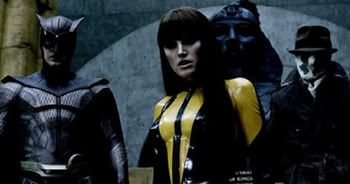

WATCHMEN
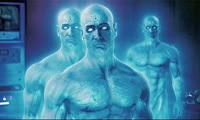
|
That was 1986, a far cry from the violence and sex that saturate comic book shelves today... to the chagrin of vigilant parents. But Watchmen holds up, because its indulgence of the amoral is really only the doorway. What lies beyond is a deeply painful and unapologetic view of the nature of human beings.
The superhero was always a farce. We knew that. But it's nice to pretend a better world existed, that individuals capable of unbelievable marvels dealt out deserved justice to our evils thanklessly, and we liked to believe we could find a little bit of ourselves among the pages.
And yet, Watchmen refuses to believe. In this alternate history, real people choose to don costumes and take to the streets: angry, jaded, and wounded deeply in the soul. They're not righteous. And their world, to our horror, isn't unbelievable. It's not even improbable. Every bit of our slovenly and capricious behavior has carried over, and we've ended up in much the same place we're in now... only worse.
This is where we enter the film, and I applaud Zack Snyder for setting the precedent for the kind
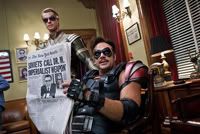
|
For the most part, the film runs parallel to the graphic novel. As with any adaptation, there are varying degrees of additions, omissions, and edits. Some of them make sense in the context of the film, while others are obvious missteps. I could launch into a detailed breakdown on how these two monolithic versions stack up against each other, but I think it's fair to say that Snyder and crew have successfully distilled not only the core narrative of Watchmen, but have also retained a substantial amount of detail and packaged it into a stylish, vibrant product that genuinely feels like Watchmen come alive.
That's not to say they left no man behind. I found most of the alterations surprisingly bearable, but there were two general changes made that I'm still having trouble choking down:
- Dialogue
The film uses a pleasantly large portion of Moore's original language, which I had hoped would not be lost on even the most indifferent filmmaker they could have signed. But, much of the crucial dialogue in the film (occurring at the climax) was highly bastardized, and in some cases re-written altogether to serve the film's purposes. I can understand the practicality of that, but Watchmen was very carefully written by a master scribe, and to try to mirror the style out of context is just obscene. Much of it comes off sounding romanticized and false, and even the ramifications of the film's climax feels hammed over when it ought to have been uncompromising. - Backstory
I understand a lot of fat trimming needs to happen in order to get a film down to a bearable running time, particularly in the case of Watchmen. But the two stand-alone biographies of Rorschach and Dr. Manhattan are, by far, the best material in the book. Not only are they heartbreaking, but they mark two very distinct points of the novel in which Moore chooses to say something a little bit more substantial about our history, our psychology, and our often misplaced understanding of the world
around us. While Manhattan struggles with being a "watchmaker" in a nuclear world -- and all the figurative layers that suggests -- Rorschach struggles with a world without God, filled with people who point fingers to avoid taking responsibility.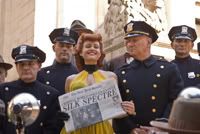
This stuff is easily the most potent writing in the book, and in both cases, neutered for the sake of following the primary plot. This might not have bothered me so much, but for the sake of putting these back in, I could have done with a few less minutes of naked humping and finger-breaking.
The action in the film is notably spectacular, and I found myself thinking that a lot of filmmakers (particularly one whose name begins with Christopher Nolan) might benefit from studying the slow-motion to fast motion fighting as its employed here. In 300, it was stylish masturbation; in Watchmen, it's downright brutal science.
That said, the action could have done with much less out-of-nowhere violence. I knew the film would be rough, and in some places gory, but wow... whatever justification Snyder and crew had in their minds when they chose some of this stuff, I'll never understand. There's definitely a point at which your film becomes indulgent in its own devices, and Snyder remains an all-too-bloodthirsty
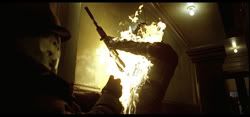
|
Performances range from pleasantly rewarding to awful, with Patrick Wilson (Dan Dreiberg) and Carla Gugino (Sally Jupiter) being the standouts on either side of the spectrum, respectively. Billy Crudup delivers a curiously misinterpreted take on Dr. Manhattan, which I struggled with for the entire film. The soft sadness in his voice is not even close to what I thought Manhattan would sound like.
The pacing of the film is surprisingly competent and restrained, and is allowed to unfold in much the same way the graphic novel does. However, that might be the film's greatest weakness to those who haven't read the book. I honestly can't recommend Watchmen to someone who doesn't already know the story. Perhaps they might be able to overcome the film's density and relative loyalty to the graphic novel, but if it wasn't for the brutal action, I doubt many would have stayed in the theater till the end. It's a lot to take in, and somewhere in the middle, things can get murky for the uninitiated.
Still, for all its flaws, Watchmen is an impressive translation that could doubtfully get better without venturing into an even more difficult marketing strategy than it already needed to solve. It feels like a production by fans for fans, and yet not so self-indulgent that it yields the book for the sake of taking over and re-imagining the whole thing. It lets the story tell itself, and in some cases -- for good or ill -- helps it along. And that's all I really wanted to see.
***

